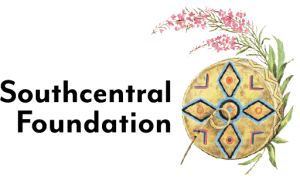Benefits of Practicing Mindfulness
By Public Relations Specialist Levi Oyster

Mindfulness has long been practiced in Alaska Native culture and values to stay grounded in the present.
Mindfulness is the practice of focusing on the present, tapping into our five senses to ground ourselves in the moment. To clear up misconceptions of mindfulness; being mindful does not require you to have a quiet mind free of emotion or a pristine location to practice. In fact, most people already practice it without even knowing it.
“A common misconception about mindfulness is that it leads to feeling good or feeling calm. More accurately, it teaches us to be present with whatever is happening in the moment, which doesn’t always feel good and that’s okay,” Southcentral Foundation Psychologist Terri Draper said.
By focusing on what we see, hear, feel, taste, and smell we find ourselves in the now and, in doing so, we can release ourselves from the anxiety of the past and future. It is a powerful skill that allowed our ancestors and those who subsist off the land to patiently observe the cold tundra and frigid waters to survive in the Alaskan wilderness. This skill helps hunters glass hillsides and ridgelines for hours for the smallest changes in the environment to successfully harvest their bountiful game.
“Traditional practices are great tools to bring back not only to help us manage symptoms of grief, anxiety, trauma, and depression but more so to reconnect us to our culture and our ancestors. That reconnection is our medicine,” SCF Traditional Healing Clinic Tribal Doctor Lois Law said.
Using our senses to tap into the present can be practiced at any time of the day and in any situation. We can practice while having our morning coffee, taking a walk in nature, engaging in a focused creative task, and even while stuck in traffic or waiting in line. When we actively focus on our five senses: the smell of the salmon as the catch of the day is filleted, the rustle of leaves while picking berries, the tactile nature of bead work, or the sight of the far-off tree while waiting at a traffic light; we bring ourselves into the present.
“I consider many cultural activities as naturally being mindful activities. Being out in nature and practicing subsistence such as hunting, berry picking, gathering traditional plants/medicine, and fishing are all activities that are mindful and can be very calming, spiritual, and centering,” SCF Traditional Healing Clinic Tribal Doctor Colleen Anagick shared.
Research suggests these simple practices reduce depression and anxiety, and help regulate the physiological effects of trauma on our bodies and minds. When we are present focused, we can observe ourselves with less judgment and live healthier lives both physically and mentally. By being mindful of our senses, we can ground ourselves in the sensations of the present moment with greater control over our thoughts, consciously choosing where to put our attention.
“Some customer-owners struggle with anxiety, grief, depression, and trauma. Engaging in mindful activities such as prayer, meditation, and breathing activities, as well as doing cultural activities helps to decrease symptoms and promote healing,” Law said.
Start your mindfulness journey today by trying the sensory counting exercise below.
For more information on practicing mindfulness, contact your primary care team to schedule an appointment with a behavioral health consultant or attend the Creating A Life Worth Living learning circle. Visit http://bit.ly/3G7iB8n to see a meeting schedule.


